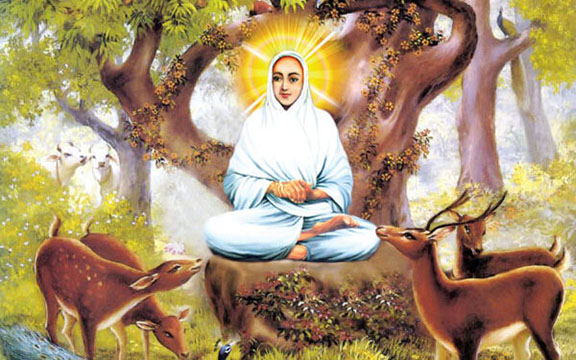
Painting of Sri Ramalinga Swamigal, proponent of vegetarianism and compassion.
Sri Ramalinga Swamigal, a great Tamil Siddhar, left an indelible mark on South Indian spirituality, inspiring future generations through his profound compassion, universal outlook, and commitment to social justice. His teachings continue to resonate, particularly through his influence on modern spiritual leaders, notably Sri Swami Satchidananda (Gurudev), who carried Swamigal’s message to the Western world in the 20th century and beyond.
Gurudev’s time in seclusion and sadhana as a young seeker (see prior installments of this series) included spending time reading the words of great saints and sages. Having been raised in Tamil Nadu and in the Siddhar tradition, Gurudev was deeply drawn to the Swamigal’s principles, particularly his dedication to vegetarianism, selfless service, and the pursuit of unity beyond the confines of religion and caste.
For those students of Gurudev reading this article, you may recognize the following poem from Sri Ramalinga Swamigal’s spiritual masterpiece Thiru Arutpa. This was one of Gurudev’s favorite poems, which he taught to his students as a chant and which is still chanted today at programs and pujas at Satchidananda Ashram and Integral Yoga centers. Gurudev chanting this poem is on the album “Songs of Grace.”
“Kallarkum Katravarkkum Kalipparulum kallipae kaanaarkkum kandavarkkum kannalikkum kannae
Vallaarkkum maataarkkum varam alikkum varamae madhiyaarkkum madhippavarkkum madhikodukkum madhiyae
Nallaarkkum pollaarkkum naduvil nindra naduvae narargalukkum surargalukkum nalam kodukkum nalamae
Ellaarkkum podhuvil nadam idugindra Sivamae
En arasae yaan pugalum isaiyum anindharulae”
Translation:
You are the Bliss, giving bliss to both the learned and the illiterate alike.
You are the dear vision, giving vision to both the ones who had seen You and the others who could not see You.
You are the very boon that endows everyone with boon—whether the person is capable or incapable of receiving Your boon.
You are the Intellect that gives intellect to both the ones who are not for You and the ones who revere You most.
You are the embodiment of impartiality—whether the persons are good or wicked.
You offer good things to human beings and to the Devas, the Immortal ones, who dwell in the divine abode.
You are the Auspicious One, Who dances in the midst of all. O My Sovereignty! Grace me by wearing the garland of song I so humbly offer to You.
The Life and Mission of Swami Ramalinga (Vallalar, Meaning, “The Generous One”)
Born in 1823 in Marudhur in the Tamil Nadu region, Swami Ramalinga was a mystic, poet, and saint who became known for his advocacy of universal compassion and the quest for enlightenment through the recognition of the Divine Light that illumines all. From a young age, Vallalar demonstrated a spiritual depth that foreshadowed his later life as a saint and Siddhar. His teachings shattered boundaries—he rejected the caste system, religious divisions, and other societal norms that segregated people based on birth, status, or wealth. Instead, he championed the unity of all human beings under a divine principle he called Arutperum Jyothi, or “the Light that bestows Infinite Grace.”
Vallalar’s core teachings emphasized the universal power of Divine Grace, love, and compassion. His emphasis on the Divine Light as the central focus of worship was groundbreaking. Unlike many spiritual leaders of his time, he did not focus on ritualistic worship or sectarian symbols. Instead, he emphasized the recognition of the Inner Light, and the cultivation of purity and devotion to the ultimate Truth, urging his followers to view spirituality as an inner journey beyond any religious labels.
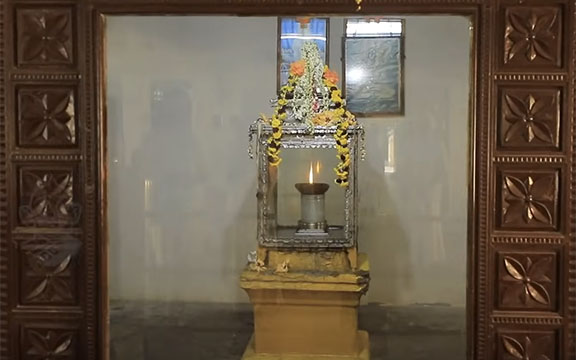
Photo: The eternal flame lit by Vallalar in 1871.
In 1871, Vallalar kindled a powerful symbol: the Sathya Gnana Deepam, the Lamp of True Knowledge. This sacred flame, placed within the Sathya Gnana Sabhai—Hall of Wisdom—in Vadalur, was inaugurated in January 1872. Enshrouded by seven veils, it represents the layers of illusion that cloud our Inner Light, each veil a reminder of the barriers to realizing the profound wisdom within. Through these flames, Vallalar’s legacy of enlightenment and empathy continues to illuminate and inspire.Here, the focus was on experiencing the Divine as Light, transcending limiting the Divine to a particular and thus embracing a formless, all-pervasive Divine Presence.
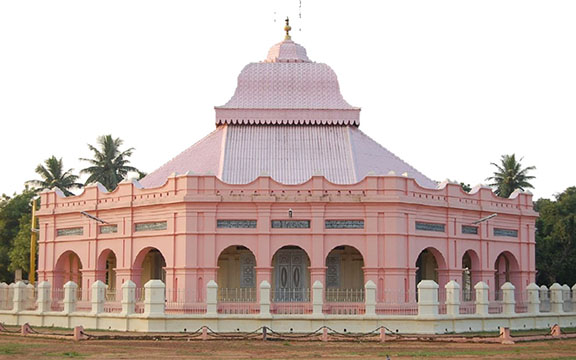
Photo: Sathya Gnana Sabhai established by Vallalar in Vadalur, Tamil Nadu, India.
Emphasis on Vegetarianism and Compassion
One of Vallalar’s revolutionary teachings was his insistence on ahimsa, or non-violence, which extended not only to human interactions but also to diet and lifestyle. He firmly believed in vegetarianism as an expression of compassion and reverence for all living beings.
For Vallalar, the act of eating was a spiritual practice; he taught that by choosing a vegetarian diet, one could cultivate inner peace, purity, and alignment with divine principles. This alignment with nature and respect for all beings later became a cornerstone in Gurudev’s teachings, making vegetarianism a central tenet in his Integral Yoga teachings.
Gurudev would draw inspiration from Vallalar’s belief in non-violence, teaching his followers that a vegetarian lifestyle is essential for those seeking spiritual growth. Through adopting vegetarianism, one could embody compassion in daily life, making choices that reflect a commitment to peace. This practice, along with meditation, became foundational to Swami Satchidananda’s teachings as he introduced Integral Yoga to the Western world.
Karma Yoga: A Path of Selfless Service
For Vallalar, spirituality was not limited to personal enlightenment; it was also about uplifting others through service. He embraced Karma Yoga, the path of selfless

Photo: First fire for cooking lit by Vallalar still burns today.
service, as an essential spiritual practice, urging his followers to dedicate their lives to serving humanity without attachment or expectation of reward. Vallalar’s compassion extended to marginalized and impoverished communities, and he considered service a profound expression of divinity. On May 23, 1867, Vallalar founded the Sathya Dharma Salai—Hall of True Righteousness—in Vadalur with a mission to nourish and support the hungry and needy. He ignited a flame in the stove there that, remarkably, still burns today, offering sustenance to hundreds daily. This perpetual flame shines as a beacon of Vallalar’s unwavering dedication to alleviating hunger and spreading compassion to all.
This philosophy greatly influenced Swami Satchidananda, who later taught Karma Yoga as a core practice within Integral Yoga. Vallalar’s call to action as he sought to create a movement centered on upliftment and support for all beings, regardless of background or belief left an indelible mark on the young Ramasamy (later, Swami Satchidananda) and was reinforced by the writings of Sri Swami Sivanandaji, who was to become Ramasamy’s Guru.
Through Karma Yoga, Swami Satchidananda emphasized that true spirituality manifests in actions that benefit others and contribute to a more harmonious society. In this way, Gurudev brought Vallalar’s and Swami Sivananda’s vision of universal service to life on a global scale, encouraging his students to serve selflessly and see the divinity in all.
Universal Teachings and the Light of Divine Grace
One of Vallalar’s most profound teachings was the concept of Arutperum Jyothi, or “the Supreme Light of Grace.” This Light, he taught, represents the boundless compassion and grace of the Divine, which illuminates the path for sincere seekers. Vallalar saw the Divine Light as an accessible, inclusive force that transcends all boundaries. His message was one of unity, urging humanity to transcend the divisions of caste, creed, and religion. Vallalar’s emphasis on the Divine Light inspired the young Ramasamy whose own spiritual teachings and mission would later seek to bring people of all backgrounds together in a spirit of unity.
This becomes apparent when Gurudev, who was sent to by his Guru to serve the Sri Lankan yogis, he initiated the first of many interfaith meetings and programs. Particularly he transformed the traditional Guru Poornima celebration of honoring one’s Guru, expanding it to include images of the holy ones from the Christian, Muslim, and Buddhist communities on the island as a means to experience the oneness of humanity. He saw this oneness as a realization of Vallalar’s message of unity through Divine Grace, exemplified in his now famous saying, “Truth is One, Paths are Many.” Vallalar’s concept of light became symbolic for Gurudev, representing the highest ideals of love, peace, and understanding.
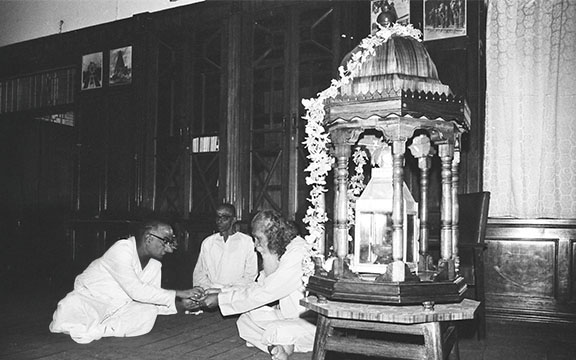
Photo: Gurudev receives gift of a Jyoti shrine from Sri N. Mahalingam, a great proponent of Vallalar’s teachings, India, mid-1970s.
Light worship, as reflected in the shrine Gurudev famously built—the Light Of Truth Universal Shrine—appears across various spiritual traditions as a powerful symbol of Divine presence, purity, and transcendence. In Judaism, for instance, the concept of the Shekhinah embodies this connection to Divine Light. Shekhinah, derived from the Hebrew root meaning “to dwell,” represents God’s divine presence, traditionally manifesting when communities gather for prayer or study. Jewish mysticism, particularly Kabbalah, interprets the Shekhinah as the feminine aspect of the divine, closely linked with compassion, healing, and justice. Shekhinah is seen as a “bride” or “queen” welcomed during the Sabbath, often represented as Divine Light that blesses and sanctifies those who seek to connect with God through sincere practice and ethical actions.
In other traditions, light also serves as a universal symbol of and metaphor for Divine energy or enlightenment. In Christianity, the concept of Divine Light reflects spiritual illumination and connection to God, while in Hinduism, Divine Light (such as seen in depictions of deities surrounded by a radiant aura) symbolizes spiritual wisdom and the eternal soul. These interpretations, though varied, share a common theme of using light to signify purity, guidance, and the indwelling presence of a higher reality.
Sacred Text and Mantra
The Thiru Arutpa, also known as the “Songs of Grace,” is the most significant work of Vallalar. Comprising around 6,000 verses, this poetic masterpiece embodies Vallalar’s mystical experiences and insights into divine truth, compassion, and the essence of spiritual liberation. His verses emphasize values such as Jeeva Karunyam (compassion for all living beings) and the pursuit of truth, urging readers to realize the Divine Light, within themselves. The Thiru Arutpa uniquely combines lyrical beauty with profound spiritual wisdom, inspiring seekers to live in harmony, serve selflessly, and embrace divine grace as a path to enlightenment.
The mantra Arutperum Jyothi, Arutperum Jyothi, Thani Perum Karunai Arutperum Jyothi—composed by Vallalar translates to “Supreme Grace-Light, Supreme Grace-Light, Infinite Compassion, Supreme Grace-Light.” This mantra is central to Vallalar’s spiritual teachings and encapsulates his vision of Divinity as an all-encompassing Light of grace and compassion. Unlike physical light, the Jyothi in this mantra represents an inner illumination of pure love, grace, and Divine Presence, transcending all material forms and definitions.
Chanting this mantra is seen as a meditative practice that invokes the Divine Light within, bringing about spiritual clarity and alignment with one’s divine essence. Practitioners are encouraged to visualize this light pouring down as they chant, allowing it to fill each cell and transform consciousness from relative to absolute, opening the heart to unconditional compassion. This process of attunement to Arutperum Jyothi represents a journey from limited individual awareness to a state of unity with infinite grace, aligning the soul with Divine truth and compassion.
Siddhis and the Disappearance of Vallalar
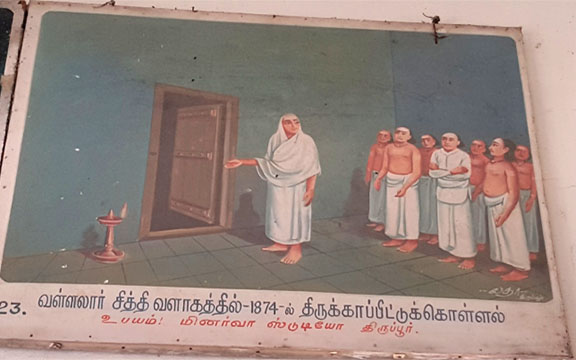
Illustration depicting Vallalar entering the room where he disappeared.
Although Vallalar was widely known for his siddhis, or spiritual powers, he discouraged any fascination with such abilities, emphasizing that true spiritual attainment lies in the purity of the heart and mind. Vallalar’s miraculous abilities led to widespread interest in his teachings, yet he remained steadfast in urging followers to transcend their desire for material and supernatural gains. According to the records, tired of the hundreds of people who came because of desire for siddhis rather than thirst for Truth, Vallalar left for Mettukkuppam, a village south of Vadalur. A few sincere devotees went with him. There, in 1874, he entered a room and instructed his devotees to lock the door behind him and keep it locked. There was only one door and one very small window to the room.
Soon, the government authorities learned of this and went to investigate. “You can’t keep someone locked in a room!” they said. “This door must be opened.” The disciples refused to disobey their Guru’s orders. Finally, the officials opened the door themselves. There was no one inside. Saint Ramalinga Swamigal had simply disappeared. The mystery surrounding his disappearance remains one of the most intriguing aspects of his legacy. The disappearance may have symbolized his ultimate teaching: that the soul, having realized its unity with the Divine, could transcend all limitations of the physical form. Gurudev’s teachings would also emphasize the impermanence of the physical and the importance of connecting with one’s true essence.
The true devotees carried on Vallalur’s teachings. Over the years more and more people began to sincerely practice what he had preached. His beautiful, universal teachings and the Light Shrine at Vadalur became great inspirations to Gurudev as he planned to make public a wonderful vision he had pondered for many years…
A Few Inspiring Quotes from Saint Ramalinga Swamigal:
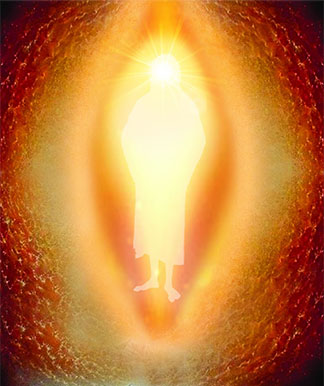
Depiction of Vallalar as Arutperum Jyothi.
- On Compassion:
“There is no higher virtue than compassion. It is the only path to realize the divine light.”
- On Unity:
“God is the supreme Light that pervades all beings. All humans are one family, united by the light of grace.”
- On Spiritual Purity:
“The heart must be pure, free from hatred and attachment, so that Divine Grace may fill it with the light of wisdom.”
- On Selfless Service:
“To serve others without expectation is the highest act of love and the path to Divine realization.”
- On Vegetarianism and Non-Violence:
“Do not cause harm to any creature. In the heart that is filled with compassion, Divine Light will always shine.”
- On Divine Light (Arutperum Jyothi):
“Arutperum Jyothi, the Supreme Grace Light, is the ultimate truth. It is the infinite compassion that shines within all, leading us to liberation.”
About the Author:
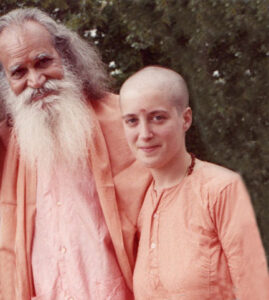 Swami Premananda, Ph.D. is a senior disciple of Sri Gurudev Swami Satchidananda and served as his personal and traveling assistant for 24 years. Her interest in the study of the spiritual roots of the Integral Yoga tradition and lineage was inspired over many years of traveling with Sri Gurudev to the various sacred sites throughout India that are a part of this tradition. She also undertook a 2-year immersion into the nondual Saiva Yoga Siddhar tradition that is at the heart of Sri Gurudev’s spiritual roots. She further studied the history, sacred texts, and teachings of Tamil Saivism including the Siddhars, bhakti poet saints, as well as the spiritual luminaries who lived in the 19th – 20th centuries and who inspired Sri Gurudev, such as Sri Ramana Maharshi, Swami Ramdas, and Swami Vivekananda. She serves as editor of Integral Yoga Magazine, Integral Yoga Publications; senior archivist for Integral Yoga Archives; and director of the Office of Sri Gurudev and His Legacy.
Swami Premananda, Ph.D. is a senior disciple of Sri Gurudev Swami Satchidananda and served as his personal and traveling assistant for 24 years. Her interest in the study of the spiritual roots of the Integral Yoga tradition and lineage was inspired over many years of traveling with Sri Gurudev to the various sacred sites throughout India that are a part of this tradition. She also undertook a 2-year immersion into the nondual Saiva Yoga Siddhar tradition that is at the heart of Sri Gurudev’s spiritual roots. She further studied the history, sacred texts, and teachings of Tamil Saivism including the Siddhars, bhakti poet saints, as well as the spiritual luminaries who lived in the 19th – 20th centuries and who inspired Sri Gurudev, such as Sri Ramana Maharshi, Swami Ramdas, and Swami Vivekananda. She serves as editor of Integral Yoga Magazine, Integral Yoga Publications; senior archivist for Integral Yoga Archives; and director of the Office of Sri Gurudev and His Legacy.

